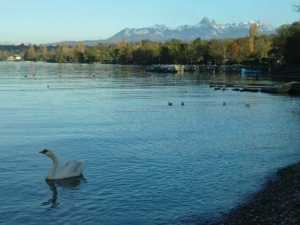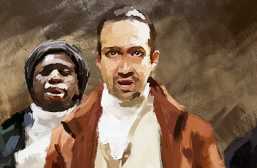Travel and literature: Broadening your horizons
‘It’s a dangerous business, Frodo, going out of your door. You step onto the road, and if you don’t keep your feet, there’s no knowing where you might be swept off to’.
– Lord of the Rings: Fellowship of the Ring, J R.R Tolkien.
Fiction is a heady, fascinating thing. With the ability to transport its readers to the far-flung corners of the universe, we can find ourselves immersed in brand new worlds without so much as moving a muscle from our seats. But what about the places on earth that inspired those authors? Whilst reading, our imaginations are able to conjure up beautiful and terrible images of just about anything we can think of. But, they are also fed by what we see and experience around us.
Travel, then, is one such experience that provides us with inspiration. Moved away from the familiar, in travelling we are thrust into the uncomfortable spotlight. We make mistakes, get lost in a town or city that is unknown to us, but most importantly, are introduced to new experiences and perspectives we had never thought to pay attention to. As Mark Twain once said in his book The Innocents Abroad, ‘travel is fatal to prejudice, bigotry, and narrow-mindedness […] things cannot be acquired by vegetating in one little corner of the earth all one’s lifetime.’ But, what is it about travel that could be said to affect our brains in such a way? Generally speaking, the majority of us like routine and stability. We like the feeling that we are master’s of our own little patch of ground on a planet that holds near over 7 billion other people. In an era where travel to far-flung corners of the globe is becoming increasingly accessible, pushed by the advent of social media, the argument could be made that we are less in awe of our surroundings. The boundaries of Twain’s ‘little corner’ are slowly being demolished.
Yet, I would disagree. Now, more than anything, people want to be inspired by new places and experiences. Articles on many trip websites (such as this one) capitalise on the assumption that, now more than ever, “getting away” is one of the best ways writers can be inspired. By that same logic, travel – more specifically, the landscapes to be explored in travelling – can most definitely be said to have inspired, and continue to inspire, some of the world’s best known authors and their works.
What are men, compared to rocks and mountains? – Jane Austen

If we take this question, posed by Elizabeth Bennett in Pride and Prejudice, to mean ‘men’ as in ‘humankind’, we can ask a similar question. How does the landscape – found and experienced by travel – affect writers? Here, I would look to the 19th century for answers. Bathed in the smoky light of the Industrial Revolution lay Romanticism; a key literary movement which shifted away from society’s focus on scientific and rational ideas to instead focus heavily on nature as one of its main themes to promote the power of the individual’s imagination. Therefore, it is not so far a leap to suggest that authors and poets, such as Percy Shelley and Lord Byron, already so receptive to their surroundings, used their travels around the country and abroad to inspire their works.
Alongside Byron and Shelley, it is the experience of Mary Shelley (then, Mary Wollstonecraft Godwin) that stands as one powerful story of how travel inspired one of the greatest modern science fiction novels of all time. The place? Lake Geneva in June 1816. Challenged to write a ghost story and confined indoors (she complains of ‘a wet, ungenial summer’ in her diary), it was not so much the lake itself, as the atmosphere that urged Shelley to pen the beginnings of her story. Thus inspired by the unusually dark and inclement weather due to the eruption of Mount Tambora in the Dutch East Indies the year before, Mary’s imagination gave birth to Frankenstein.
Yet, consider more modern examples of authors being inspired by travel, and we can look to the genesis of the world’s most famous boy wizard; Harry Potter. One of the most well-known travel stories is of J.K Rowling’s train journey from Manchester to London in 1990. Not only did it herald the start of a new journey for her, but when The Philosopher’s Stone first saw publication several years later, the starting inspiration from one delayed train journey birthed a franchise that would soon span the globe.

The Darker Side of Travel
However, whilst travel is an activity usually done by choice, there are other types of ‘travel’ to consider when discussing authorial inspiration: war, for example. Inspiration fed by such changes of scenery in war-torn fields can come from the darkest of places. In war, there is an immediate, raw horror of experience as shown in Ernest Hemingway’s A Farewell to Arms, Wilfred Owen’s poetry, and to a lesser extent as Tolkien describes in his letters, the dead marshes in The Two Towers. Tolkien and Hemingway both served on the front lines in the First World War: Tolkien, most notably, in the Royal Fusiliers at the Battle of the Somme in 1916, and Hemingway in the Italian campaigns. From these works stem haunting, poignant scenes, that attest not only to the horror of war, but the change in the landscape that modern warfare brought.
Travel for authors, therefore, is not just about escapism. It is one shaped by world events, and circumstance. Certainly, the extent to which travel can inspire is dependant on the author and of the time they lived. Would Shelley have been so inspired to write Frankenstein had not bad weather and ghost stories kept her to the house? Would J.K Rowling have ever written Harry Potter if she had never taken that train journey? These are questions to ponder. However, in this modern age, we must also think of our finances when we think of travel. Romantic notions of writing the next bestseller in a leather bound notebook in a Parisian cafe are replaced with practicalities such as ‘how could I afford this?’ As one blogging travel writer comments, ‘dispel any romantic notions you might have’ – travel writers are constantly on the go and to move about is an activity that does not come cheaply.
That is not to discourage budding writers. Landscapes and situations on earth have done much to push the boundaries of imagination for better or worse, and it is always one that is continually full of surprises. You need only step out of your door to find them.
What do you think? Leave a comment.











I’m actually in the process of writing my first novel that’s inspired by travel!
Congratulations! While it’s a goal I have for myself, I can’t begin to imagine the reality of starting and the process of continuing!
I am not a writer, but when we travel, I sometimes find the inspiration to open my computer and write and it was one of the most fulfilling experiences for me.
Love the post, a great practical reminder of the realities of the frequently glamorised location independent lifestyle.
I like to take a break after about three hours of driving, and while I get my coffee and meal or snack I boot up, make notes or write, and quickly check me email.
The phenomenology of travel is somewhat different today. Seeing the same corporations everywhere and also the transnational nature of writers brings a new perspective which I think is sorely needed.
One of the most effective methods I’ve found is batch writing. I often will write 3-4 blog posts in a day and schedule them out for the following week.
Last year I spent a year in Italy writing. What hit me is that I felt like I never had enough time to journal when I was on weekend trips. Eventually I found that since most museums and sights were only open from around 9-6 (things are different in Europe) I would wake up in the morning, eat breakfast, and get my ideas out.
Loved this post.
I frequently travel by bus to Boston. It takes about about three-and-a-half hours, just about the length of time the battery on my laptop lasts. I spend the time writing articles for my website.
I just write. I edit when I get home, a process that requires three to four hours for every one I spend writing because I do some research to back up my ideas.
This is such an interesting post. Before leaving the UK to travel I was working as an online journalist in London as well as blogging and taking creative writing evening classes; I thought that once I was on the road I’d have so much time for new writing projects.
In reality, I’ve barely had time to keep up my blog and complete the freelance writing contracts I’d lined up before leaving the UK. My biggest obstacles were not having a routine or a comfy place to write as well as suffering from travel fatigue.
Traveling around the world for a year opened my eyes in so many ways. Many expectations proved wrong, especially about having so much extra time for writing. Writing’s hard work and often the pull of a beach or a hike or a walk in the park is much stronger. You have to make time.
Balancing travel and writing is hard!
Totally agree to your conclusion. All I need is a writing implement and paper.
Write anywhere, any how, any time.
I tend to do my best writing on the train or in a coffee shop. Can’t wait to try out a winter cabin.
Trying to write consistently with any semblance of normal quality (or productivity level) while traveling is crazy difficult! I used to go back home every year and take a month or two off the road, and that is when I would get the most of my writing done. But now that I’ve sold my house and am living as a permanent nomad, my level of writing has dropped significantly.
What hinders me to write more often, or more, or better? HEAT! I am extremely tired in tropics, when the temperature hits 30 C, I am done and I need to wait for sunset to ‘wake up’ again.
Conditions will never be perfect and if we wait for perfection we will never write.
I frequently write while traveling. In fact, I’m leaving on a traveling/writing vacation this weekend, using the trip itself as a way to recharge and get some writing done. I find the change of scenery does a lot to recharge my creativity.
I often find that whilst walking somewhere suddenly sentences and even whole paragraphs will enter my head for something I plan to write about. Instead of stopping and writing them down and in doing so breaking the flow, I actually use my mobile phone to record my thoughts just as you would use a Dictaphone. I often find that by the time I have gotten home I will have recorded so many thoughts, points and actual paragraphs that the piece I had planned to write will be nearly complete and saves time trying to remember what I was thinking.
I love writing while travelling. And I mean that in the literal sense: on trains, buses etc. Even if it’s just a case of making a few notes or scribbling some ideas, it’s a time when you’ve got little else to distract you.
If I would rely just on my memory and not writing any notes in the train, bus, boat, whilst waiting for a train, bus or boat, there would be much less material and info covered in our stories and posts.
Nice article. Thank you for sharing.
A good read. I think, like travel, any experience that prompts a writer to move beyond their own comfort zones is always a positive (in the sense of constructive) act that can aid in the development of their writing. Travel especially captures the imagination as it can include “culture shock” that forces us to reconsider our perceptions of the world around us, but lesser acts can also allow a writer to find new points of view.
Gosh, I love this article. Perhaps it’s because it seems almost like a conversation I am having with myself.
An interesting experience for modern-day writers is the stress that comes with writing for a financial purpose. What I mean is traveling is great and it does broaden your horizons but unless you are lucky to write for a well-established publication, being a young writer limits where you can “travel” to. I think that’s why it’s important for writers and nonwriters to educate themselves with the literature of all genres.
Really good article. I went to Praga last week and indeed seeing such different lifestyles was very inspiring.
My imagination runs wild on the notepad when I am traveling. Coming from the South in Atlanta, when I visited New York and LA I was filled with ideas that could wait to hit the notepad.
I am currently experiencing a year of travel and it has stimulated my creative side significantly. The distance from home seems to encourage the establishment of a fully independent identity–no one you meet can relate to the context of who you are and where you are from, only who and what you are relative to the present. Travel is proving to be the experience that has me coming into myself with enough confidence to embrace my writing skills.
I think one of the reasons why writing and traveling work together so well together is that it acutally gives you time to be alone with your thoughts, to be bored and to just look out (a window) and think…
Traveling is a great way to experience new environments first hand and can definitely contribute to a greater passion within writing. A worthwhile investment.
Travelling is dangerous and expciting for me – on one hand exists all the new opportunities for inspiration, on the other is all of the opportunities for distraction from what I want and need to get done. Both are the same thing really, just looked at from a different angle.
Great article!
Sometimes travel doesn’t only open our eyes to new perspectives, but sometimes it even reinforces what we already know. Travel allows us to find differences and similarities in attitudes and values.
I try to keep a journal of sorts when I travel, so that later it can fuel a story.
I think that travelling to new places and experiencing those places leads to influencing writing later on when it has been absorbed.
I’m heading to Europe later this year and even though I probably won’t write much during the trip I hope the experience will lead to something down the track.
Good. The cost of travel. When I was on a dating site, I often read essays by women talking about the places they went and where they were planning to go next and how often, wondered where all the money came from. Having traveled, I realize how I needed to financially prepare. Planning to travel again, once again the need to financially prepare. The luxury of travel, is a good way to think about it.
I get new ideas when I travel by bus or plane
I love this discourse! This also reminds of the Transcendentalist poets of this time period who believed in the “sublime,” almost literally a high achieved from being in nature. That subliminal state, they believed, brought one closer to the divine. Also within the movement was the creation of utopian societies which focused on an austere lifestyle and self-sufficiency; Louisa May Alcott’s father, Bronson Alcott, along with Thoreau and Emerson participated in this offshoot of transcendentalism. An example of this within LM Alcott’s work is in the lifestyle of the March sisters; however, the Marches lived during the Civil War, so their austere lifestyle could be perceived as a war-time occurrence/anomaly.
I love this essay.
I write when I travel so I know what happened. There is so much stimulus that it doesn’t make sense until I write it down–writing is a filter that highlights and organizes what I have decided to learn from the experience, a fertilizer for personal growth, a way I can understand the way I have been changed. I only wish that I could view experience at home the way I can when I am not.
My mom has suggested I try travel writing as a profession multiple times, and I admit the idea is tempting. I think it would just be nice to have an excuse to explore new places!
Travelling is directly proportional to exploring the world.
excellent piece!
A good essay. I’ve read a number of books on travel and I enjoy reading essays that address these books.